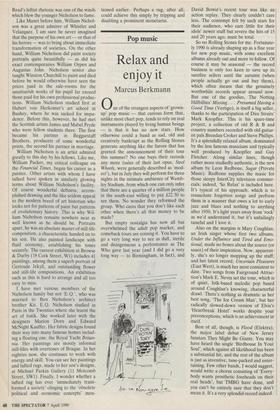Pop music
Relax and enjoy it
Marcus Berkmann
0 ne of the strangest aspects of 'grown- up' pop music — that curious form that, unlike most chart pop, tends to rely on real instruments played by living human beings — is. that it has no new stars. How otherwise could a band as sad, old and creatively bankrupt as the Rolling Stones generate anything like the furore that has greeted the announcement of their tour this summer? No one buys their records any more (sales of their last opus, Steel Wheels, were generally described as 'mod- est'), but in July they will perform for three nights in the intimate ambience of Wemb- ley Stadium, from which one can only infer that there are a quarter of a million people in the south-east willing to pay £22.50 to see them. No wonder they reformed the group. Who cares that you don't like each other when there's all that money to be made?
But empty nostalgia has now all but overwhelmed the adult pop market, and comeback tours are coining it. You have to go a very long way to see as dull, sterile and disingenuous a performance as The Who gave last year (and I did go a very long way — to Birmingham, in fact), and David Bowie's recent tour was like an action replay. They clearly couldn't care less. The contempt felt by such stars for their audience, who care little for their idols' newer stuff but revere the hits of 15 and 20 years ago, must be total.
So no Rolling Stones for me. Fortunate- ly 1990 is already shaping up as a fine year for new pop music, with some excellent albums already out and more to follow. Of course it may be seasonal — the record business is only too keen to save up its surefire sellers until the autumn (when people actually go out and buy them), which often means that the genuinely worthwhile records appear around now. But one of the goodies, The Notting Hillbillies' Missing . . . Presumed Having a Good Time (Vertigo), is itself a big seller, thanks to the participation of Dire Straits' Mark Knopfler. This is his spare-time project, a collection of old R & B and country numbers recorded with old guitar- ist pals Brendan Croker and Steve Phillips. It's a splendidly relaxed album, dominated by the less famous musicians and typically well produced by Knopfler and Guy Fletcher. Along similar lines, though rather more studiedly authentic, is the new album by Leon Redbone, Sugar (Private Music). Redbone supplies the music for those sleepy InterCity television commer- cials: indeed, 'So Relax' is included here. It's typical of his approach, which is to resuscitate forgotten songs and perform them in a manner that owes a lot to early jazz and blues and nothing to anything after 1950. It's light years away from 'rock' as we'd understand it, but it's unfailingly tuneful and I love it.
Also on the margins is Mary Coughlan, an Irish singer whose first two albums, Under the Influence and Tired and Emo- tional, made no bones about the source (or sauce) of their inspiration. Now, apparent- ly, she's no longer mopping up the stuff, and her latest record, Uncertain Pleasures (East West), is much her most consistent to date. Two songs from Fairground Attrac- tion's Mark E. Nevin set the tone, which is of quiet, folk-based melodic pop based around Coughlan's knowing, characterful drawl. There's nothing as dramatic as her best song, 'The Ice Cream Man', but her radically slowed-down version of Elvis's 'Heartbreak Hotel' works despite your preconceptions, which is an achievement in itself.
Best of all, though, is Flood (Elektra), the major label debut of New Jersey funsters They Might Be Giants. You may have heard the single 'Birdhouse In Your Soul', which against all likelihood has been a substantial hit, and the rest of the album is just as inventive, tune-packed and enter- taining. Few other bands, I would suggest, would write a chorus consisting of 'Every- body wants prosthetic foreheads on their real heads', but TMBG have done, and you can't be entirely sure that they don't mean it. It's a very splendid record indeed.


























































 Previous page
Previous page